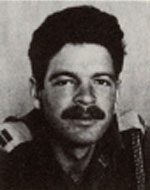David, son of Miriam and Aryeh z “l, was born on June 23, 1948, in Kibbutz Tirat Zvi, where he completed his elementary and high school studies in Sde Eliyahu, He was an example of a social leader in his group, and was always a symbol and model for all his friends, and in his high voice, in his deep and authoritative voice and in his adult behavior, was the first and foremost of all his friends in the group. He was a sports enthusiast and was an outstanding player in the field of volleyball and was a member of the Elitzur team in Tirat Zvi. He was drafted into the Israel Defense Forces in early January 1967. After completing his basic training, he completed a course for commanders and officers of the Infantry Corps. The Six Day War took part in the battles of Um-Katef and in 1968 he moved to the Armored Corps. He was an exemplary officer and commander. In the assessments written by his commanders, they all noted his dedication, his diligence, and his efforts to obtain the maximum from his soldiers as fighters, and praised his soldiers’ love for him as commander and friend. This love was acquired by virtue of his warm and humane attitude towards his subordinates, understanding of others and a willingness to come to his soldiers, to help them and to encourage them in times of crisis. He was the symbol of the personal example, never required his men to do something he did not commit himself. He would do the exercises and training with them as one of them. He spent much of his regular service in the Suez Canal strongholds during the War of Attrition. The stronghold that commanded him was always an example and model in his organization, in the order in which he was in possession of the weapons and in their cleanliness. During his service, he tried not to worry about his family, often wrote letters home, and never told of his difficulties or of the dangerous activities he took part in. He used to tell about it only after everything was past and the dangers passed. His period of regular service was nearing completion, but he was asked to serve another period in the career army. In 1970, David was discharged from regular service and returned to the kibbutz, where he married a daughter of Tirat Tzvi and wanted to establish a family and a home on the kibbutz. In January 1972, his daughter was born, and he had a rare relationship with his wife and daughter, and when the daughter was born she fought to live in the parents’ home, in contrast to the custom that prevailed In the kibbutzim, he shared his actions with his wife and more than once the friends wondered when they saw his wife and daughter visiting the chicken coop. His wife came to the chicken coop to be close to him, and their family life was a complete idyll, full of understanding and mutual respect, and David’s brother, who was younger than him, admired him and their relationship was much more than just a brotherly relationship. After the marriage of David, his brother continued to come to him, to talk with him, to discuss problems and to consult with him.In the Yom Kippur War, David was drafted and joined his unit in the Sinai on October 21, 1973, The Egyptians in Masuri. On the eastern bank of the Suez Canal, was wounded and killed during battle. He was brought to eternal rest in the Tirat Zvi cemetery. Survived by a wife – Rivka, daughter – Yodfat, parents, brother – Aharon and married sister – Malka. After his fall, he was promoted to the rank of captain and was awarded the “Medal of Honor” for his work in combat. This is the language of the medal: “Captain David Glazer,During the Yom Kippur War, on October 21, 1973, during the attack on the Egyptian unit at Masuri on the eastern bank of the Suez Canal, the security of the company that commanded the tank forces, and cleared the area following them, Captain David Glazer, He was driving his men in the command line, storming a hill where Egyptian soldiers were barricaded, throwing grenades and firing a machine gun, while the fighter was hit and killed, and the late Captain Glazer demonstrated excellent leadership and courage and served as a model for his soldiers Throughout the war. “In a letter of condolence to his widow, the commander of his unit wrote:” Soon we will be released and go home. Your husband David is not released with us. In this bitter and bitter war he gave his life to defend our country. Your great pain is also our pain. The memory of David is with us and it is a precious memory for all of us. Who will be worthy of his memory. “A new Torah scroll was added in his memory to the synagogue of the kibbutz, and his family and his family published a pamphlet in his memory, in which the family and friends and commanders spoke about David’s image – a brilliant commander, , Husband, brother and son exemplary.
